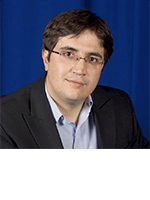Osman Anderoglu

Associate Professor
Department of Nuclear Engineering
Education
Ph.D. Texas A&M University, Materials Science and Engineering, 2010
M.S. Texas A&M University, Mechanical Engineering, 2004
B.S. Bogazici University, Mechanical Engineering, 2001
Biography
Dr Anderoglu joined The University of New Mexico as an assistant professor in 2016. Prior to that, Dr Anderoglu was a technical staff member in the Materials Science and Technology Division at Los Alamos National Laboratory. His current major research interests center on advanced alloy development for nuclear applications, advanced manufacturing techniques, radiation damage in materials and structure- property relations. He has been working on the development and qualification of advanced ferritic FeCrAl alloys for accident tolerant fuel systems and Ni based alloys for advanced reactor applications. In addition, he has been investigating both fundamental aspects such as phase stability and structure of the metal-oxide interface and engineering problems such as thin walled tube forming using advanced manufacturing techniques such as electrically assisted forming. Dr. Anderoglu is the author/co-author of 35 peer reviewed publications, 1 book chapter and more than 10 technical reports.
Professional Experience
- 2022 • University of New Mexico • Associate Professor • Nuclear Engineering Department
- 2016 - 2022 • University of New Mexico • Assistant Professor • Nuclear Engineering Department
- 2013 - 2016 • Los Alamos National Laboratory • Technical Staff Member
- 2010 -2013 • Los Alamos National Laboratory • Postdoctoral Research Associate
Publications
To view a complete list of Professor Anderoglu's publications • https://scholar.google.com/citations?user=FnGdj94AAAAJ&hl=en&oi=ao
Teaching Interests
- NE 371 Nuclear Materials Engineering (Spring)
- NE 515 Irradiation Damage in Materials (Fall)
Research Interests
- Advanced manufacturing and characterizations techniques.
- Advanced materials development and qualification for next generation nuclear reactors.
- Development of cladding materials with improved accident tolerance.
- Growth, microstructure, mechanical and electrical properties of thin films.
